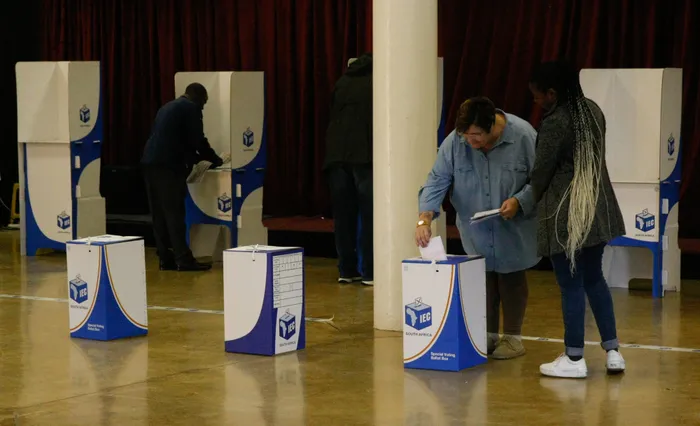Coalition government likely to put privatisation of SOEs on ice, analysts say

South Africa - Pretoria - 29 May 2024 - Vote2024 - Voting at the Pretoria Chinese School in Wingate Park Picture: Jacques Naude / Independent Newspapers
State-owned Enterprises (SOEs) are likely set for a new lease on life.
There are expectations that coalition politics at national level in the next administration would likely curb privatisation and stronger coalitions would help investor confidence.
This is as election results are trickling in as the ballots are counted. Indications are that the ruling ANC is on the backfoot on gains made by the DA, EFF and upstart uMkhonto Wesizwe (MK) Party.
Professor Sandilwe Swana of Wits Business School yesterday said there were many bones of contention that would even determine the extent of privatisation of SOEs.
“There will not be the mass privatisation that the ANC and those that voted it to power were likely to see happening,” Swana said.
“The emergence of the MK Party, for example, signals that in the near term, whoever is in government will not get away with the privatisations.
“We have seen how the Public Private Sector (PPPs) have helped in big projects, including the N3 and N4 highways, and the long-term ownership of these assets has not been compromised.”
Swana said the dilution of political power would hopefully lead to more strategic decisions on the SOEs.
“The idea that you can sell South African Airways to your friends is dead in the water. The economy will not move forward without aggressive investment by the state,” he said.
According to the Council for Scientific and Industrial Research (CSIR) projections, the ANC is currently on track to win 42% of the votes cast in Wednesday’s national election. Early results also showed a recovery in support for the DA at 22.3% and a fall-off in support for the EFF.
Corporate and advisory firm Deal Leaders International (DLI) said CSIR projections indicate the ANC was currently on track to win 42% of the votes. It was worrying in that it precipitated coalition deals amongst the political parties, which was not such good news for the markets.
DLI CEO, Andre Bahlmann, said that politically, this might be good news but the markets do not like the uncertainty of unstable coalitions.
“These projects give the ANC the option of partnering with the market-friendly DA, which markets would undoubtedly prefer, or one of the two populist parties that advocate for the nationalisation of mines and banks,” Bahlmann said.
“The possibility of an unstable coalition is causing concern in financial markets, as such a coalition would likely demand policy changes that could discourage investment.”
The Electoral Commission of South Africa (IEC) had counted just around 20% of the votes by 3pm yesterday afternoon, and the ANC was leading the race though at a muted rate below 50%.
Pundits believe that there would be policy normalisation, stabilisation and continuity if the ANC forms a national coalition government with a market-friendly party.
Irrshad Kaseeram, professor of economics at the University of Zululand, said although the President Cyril Ramaphosa-led government had come up with viable strategies to improve the SOEs performance, it had not convincingly provided a clear signal that it was willing to sanction all corrupt officials to the full extent of the law.
“However, post May 29 might herald an opportunity for SOEs to become more efficient, for the ANC government is likely to return to power perhaps with a coalition government which will force them to improve on three fronts, good governance, promoting management efficiency, and financial performance,” Kaseeram said.
“Strong governance structures are needed in the form of powerful boards devoid of party political cronies and political interference. Instead boards must comprise of qualified, independent board members with relevant industry experience to ensure strategic decision-making.”
University of the Free State’s sociology associate professor, Sethulego Matebesi said the ANC would still retain control over the economy, whether it has the majority vote or not.
“The changes will not change the landscape. We will need a new class of ANC leadership who will try and have the appetite for better management,” Matebesi said.
“Somehow I don’t see that happening. They will lose the electoral support but for them, it is a case of that ‘we still get the votes so why do we need to change.”
